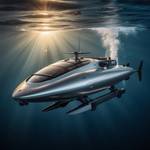Ship Repair
All ships need maintenance and repairs. Many repair and maintanance operations can be performed at sea or by the crew in port. Complicated or large-scale repairs might require the ship to be removed from commercial operation. Classification Society supervision is required for most large-scale repairs, particularly those carried out in a ship repair yard. For oceangoing ships, particularly tankers, the ship has to be prepared for repair at a Deballasting Station. The tank must be thoroughly cleaned and its slops (grey water and hydrocarbon residues) must be pumped ashore according to environmental regulations.

Global Shippers Await Word on US Port Fees for China-Linked Vessels
The U.S. Trade office will this week announce its plan for levying port fees on China…

Seaspan Boosts Investment in Automated Welding Technology
Seaspan Shipyards has announced a $5 million investment in Novarc Technologies Inc.…

U.S. Navy Needs to Rethink Private Sector Industrial Base Investments
The U.S. Government Accountability Office (GAO) has published a report indicating…

SCA’s Paxton Testifies to Congress on Bolstering U.S. Shipbuilding Base
[The following are exerpts and paraphrasing from testimony given by Matthew O. Paxton…

Maersk Partners With Cochin Shipyard
A.P. Moller - Maersk and Cochin Shipyard Limited (CSL) have signed a Memorandum of…

Dales Marine Services Appoints McLean
Dales Marine Services (DMS) appointed Euan McLean as its new Business Development Manager.

Japanese Firms Use Laser Tech for Rust and Coating Removal from Vessels
Mitsui O.S.K. Lines (MOL), MOL Drybulk, Furukawa Electric, and Tsuneishi Shipbuilding…

BAE Systems Ship Repair Begins Making Submarine Components
BAE Systems won a contract by General Dynamics Electric Boat for deck module fabrication…

Interview: Lane Richards, Everett Ship Repair
Lane Richards has worked in the maritime industry for 22 years. He began his career…

Floating Dock Set to Position Takoradi as Ship Repair Hub
Specialist provider of offshore support services, Interocean Marine Services is supporting…

Alabama Shipyard to Repair USACE's Largest Hopper Dredge Wheeler
Mobile, Ala. ship repair yard Alabama Shipyard has been awarded a contract to repair the U.S.

Titan Taps Francesco Valente to Succeed Jim Marcotuli as CEO
Titan, a ship repair and fabrication company with yards on the U.S. West and East Coasts…

The maritime industry is on the brink of a revolution, with autonomous and unmanned marine vehicles poised to redefine the future of shipping. These innovative vessels, powered by advanced technologies and cutting-edge propulsion systems, offer numerous advantages, including increased efficiency, reduced operational costs, and enhanced safety. In this article, we'll explore the current state of autonomous marine vehicles, their propulsion systems, and the potential impact they may have on the global shipping industry.
The maritime piracy menace is an old one, but it continues to be a significant threat to the global trade and security of the seas. Piracy is a major challenge today, despite concerted efforts by international organizations to combat this illegal activity. New developments and persistent threats are shaping the current landscape.
The maritime industry is undergoing a significant transformation as it seeks to reduce its environmental impact and comply with increasingly stringent regulations on emissions. One of the most promising avenues for achieving these goals is the adoption of alternative fuels in marine propulsion systems. These fuels, including liquefied natural gas (LNG), biofuels, hydrogen, and ammonia, offer various benefits and challenges that are reshaping the future of marine propulsion. This article provides a technical overview of the key alternative fuels currently being explored and their implications for the maritime industry.
Electronic devices classed for use in the marine environment. All electronics used onboard must be designed to fit in the small confines of a bridge and can come in contact with salt water, so they are made to be very water resistant or waterproof.
Private Security Companies (PSCs) play a crucial role in combating maritime piracy, especially in high-risk areas such as the Gulf of Aden, the Indian Ocean, and parts of the West African coast. The increase in piracy, particularly in the early 2000s, led to a higher demand for specialized security services.

















 Read the Magazine
Read the Magazine
